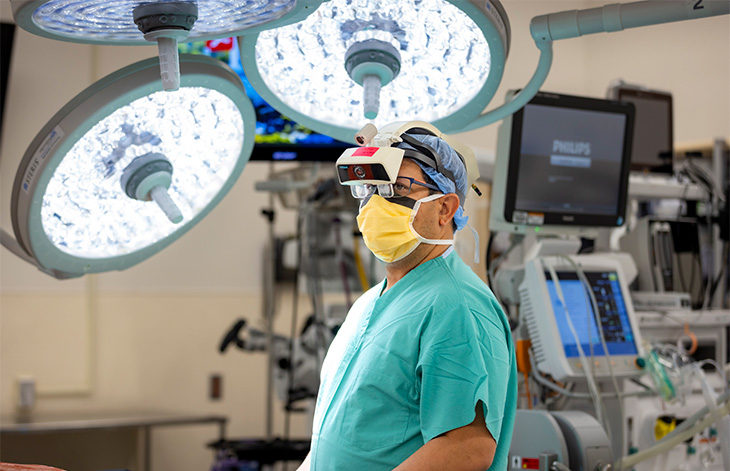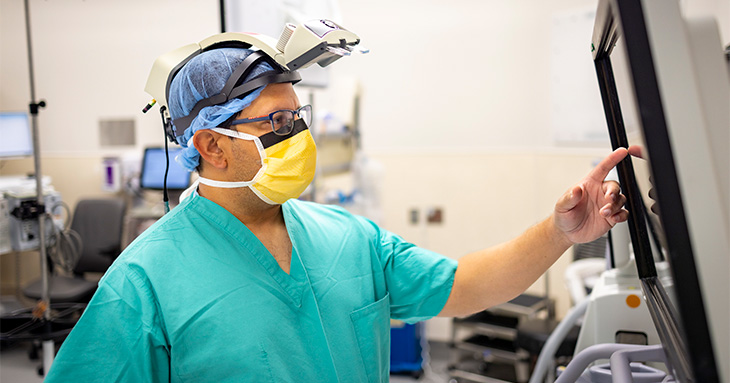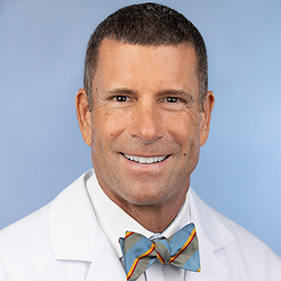When spine surgeon Safdar N. Khan steps into the operating room, he's equipped with technology that's probably associated more with superheroes than doctors — and it's been a game-changer for his approach to spine surgery.
Khan is one of the first surgeons in the country to use augmented reality (AR) glasses, a tool that gives him the equivalent of X-ray vision while operating on a patient. This essentially allows him to see beneath the skin without making a single incision, so he can get a high quality two-dimensional and three-dimensional look at the patient's spine.
This imaging technique enables Khan to operate with enhanced accuracy and precision, which are paramount during spine surgery, when surgeons have to navigate complex and delicate parts of the spinal architecture, including nerves and the spinal cord.
"Accuracy is the number one tenet in spine surgery," Khan said. "Augmented reality has allowed us to take spine surgery to the next level."

AR allows him to make smaller incisions on patients, as he's able to meticulously plan the surgery through the glasses. He's also able to conduct more efficient and shorter operations, which helps reduce surgical trauma and pain — and shortens recovery time.
AR has proven especially helpful for procedures that involve implanting devices or screws to help stabilize a patient's spine. And Khan says AR has endless potential for a wide range of spinal issues, including complex spinal deformity, degenerative age-related spinal conditions, spinal trauma, and tumors.
An eye for innovation
Khan decided to explore the use of AR after seeing patients come in with increasingly complex challenges. He felt that the standard operating room imaging technology, like intraoperative X-rays and CT scans, wasn't going to be sufficient for addressing these issues and believed that surgeons would need to innovate to find better solutions. When he heard about the possibility of a medical application for AR, he saw immediate potential for leveraging it in the operating room.
"I think AR is the next step within the zeitgeist of surgical innovation, where we have to think outside the box to find solutions that match the challenges we're seeing," he said. He adds that it could be an ideal training tool for the next generation of surgeons, as many young people have interacted with video games, artificial intelligence, and virtual reality.
Khan just joined UC Davis Health as a professor of orthopaedic surgery and the vice chair of surgical innovation in the Department of Orthopaedic Surgery, a new position. He joins UC Davis Health after 12 years at the Ohio State University Wexner Medical Center, where he was professor and chief of the Division of Orthopaedic Spine Surgery and The Benjamin R. and Helen Slack Wiltberger Endowed Chair in Orthopaedic Spine Surgery. He's also held a prestigious fellowship position at Rush University Medical Center in Chicago and served a research fellowship at the Hospital for Special Surgery in New York City.
This is a first-of-its-kind at UC Davis Health and demonstrates our firm commitment to fostering translatable technological innovation - and helping our faculty catalyze their entrepreneurial ideas."-R. Lor Randall, chair, Department of Orthopaedic Surgery
Khan's research focus has included the biological underpinnings of disc regeneration and spinal fusion and functional outcomes after spinal surgery. And he has published over 200 peer-reviewed research papers and 18 book chapters and presented his research around the world.
"Dr. Khan is our inaugural vice chair for surgical innovation," said R. Lor Randall, chair of the Department of Orthopaedic Surgery. "This is a first-of-its-kind at UC Davis Health and demonstrates our firm commitment to fostering translatable technological innovation — and helping our faculty catalyze their entrepreneurial ideas."
Expanding augmented reality at UC Davis
Khan plans to build out an AR program at UC Davis, to explore the full potential of the technology and to probe the big questions that will drive the future of AR. Such as, how can it best improve patient outcomes? Can it be employed as an effective teaching tool before and after surgery? Can it help minimize hospital stays and opioid use — and give certain patients the option to pursue an outpatient procedure?

"We want to be at the forefront of asking and answering questions now that are going to be relevant in five to ten years," Khan said.
His desire is to plan and build an AR studio through UC Davis' Aggie Square, the large-scale innovation hub that's currently under construction in Sacramento. There, he will foster collaboration with industry partners and translate discoveries into cutting-edge clinical applications. The AR studio will be a first and best in class arena to evaluate and bring in new AR technology as it evolves in spine and orthopaedic surgery. He has experience with securing patents and launching startups that he'll bring to this role. He hopes to work with colleagues across other departments, including the Department of Neurological Surgery, to forge interdisciplinary partnerships that can tackle the big questions in surgical technology together.
"I want UC Davis to be a pioneer and leader in this space," Khan said. "My vision is to build an innovation incubator that's at the forefront of using augmented reality to improve patients' outcomes and return them to the life that they want to lead as quickly as possible."
Khan's professional transition to UC Davis Health is a bit of a homecoming for the surgeon. He completed his six-year residency in orthopaedic surgery at UC Davis in 2011, including a research year, where he discovered that fat-derived cytokines play a significant role in fracture repair. He collaborated with orthopedic surgery specialist Mark Lee on this research, who's the chief of trauma service and the vice chair of education. Khan also met his wife Sabrina Sykes at UC Davis, a clinical psychologist who also joined the institution this fall.
"It's wonderful to be back in the Sacramento area and reconnecting with figures that played such an incredible role in my own education and my own success," he said.
"As we looked to recruit Dr. Khan, it became clear that he brought the national reputation, leadership skill, and content expertise for the department to establish this new role of vice chair for surgical innovation," said Randall. "The entire health system will benefit from his grace, skill, and knowledge."







